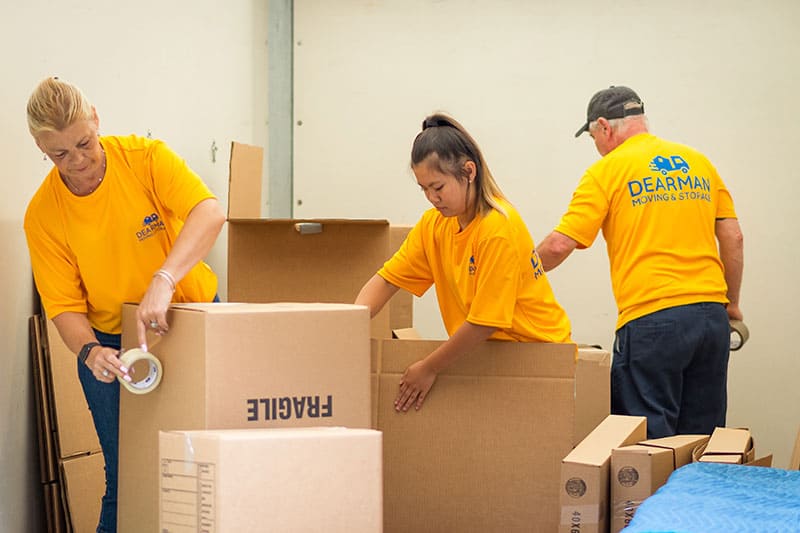Comprehending the Inclusions of moving and Freight Forwarding worldwide of Worldwide and residential Shipping
Steering with the intricacies of moving and Freight forwarding can be tough. Both procedures include unique procedures and requirements that are critical for successful transportation. Understanding the differences in logistics, documentation, and risk administration is essential for individuals and companies alike. This expertise can greatly affect the performance and safety of shipments. Many are not aware of the particular parts that affect the overall experience and outcomes. What factors should one consider to assure a smooth changeover?
The Fundamentals of moving and Freight Forwarding
moving and Freight forwarding are basic elements of the international logistics industry. They facilitate the transfer of products and individual items across residential and international boundaries. moving mostly includes the moving of people or households, encompassing industrial and household needs. It normally consists of packaging, packing, moving, and unboxing products at the destination. In comparison, Freight forwarding is concentrated on the delivery of items, frequently in bulk, using numerous transport modes, such as sea, air, or land.freight forwarders work as middlemans, coordinating logistics to guarantee prompt delivery while steering with complicated guidelines and personalizeds treatments. Both processes require cautious preparation, company, and interaction to ensure effectiveness and lessen disturbances. Recognizing these principles is essential for any person entailed in logistics, as they prepared for more advanced facets of delivery and transport administration.
Secret Parts of Freight Forwarding Solutions
Freight forwarding solutions incorporate a number of essential elements that assure smooth transport of products. Secret duties of Freight forwarders consist of handling logistics, collaborating shipments, and handling customs clearance. In addition, recognizing necessary delivery documentation is crucial for compliance and efficient activity of cargo.
Freight Forwarder Responsibilities
A reputable Freight forwarder plays a vital role in working with the transport of products, guaranteeing that shipments are handled successfully and in conformity with guidelines. Their obligations include different vital tasks, including selecting perfect transport paths, working out Freight prices, and managing logistics. They act as intermediaries in between providers and shippers, making sure that freight is appropriately packaged and labeled for risk-free transit. Additionally, Freight forwarders track deliveries, providing updates to customers about the condition and anticipated delivery times. They likewise assess and handle threats connected with transport, advising insurance coverage alternatives as needed. By assisting in interaction and documentation, Freight forwarders enhance the shipping process, lowering potential delays and boosting general supply chain performance.
Delivering Paperwork Essentials

Understanding Personalizeds Clearance and Documents
Accurate paperwork is essential in the personalizeds clearance procedure, as it ensures conformity with various regulations. An introduction of customizeds policies highlights the complexities dealt with by shippers and Freight forwarders. Usual clearance challenges can significantly impact delivery timelines and expenses, making understanding this element vital for effective logistics.
Relevance of Accurate Documentation
Steering with the intricacies of international shipping calls for an eager understanding of customizeds clearance and the critical duty of documents. Precise documentation is important for making sure that deliveries abide with guidelines and reach their locations immediately. Effectively prepared records, consisting of costs of lading, industrial billings, and packing lists, help with smooth interactions with personalizeds authorities. Inaccuracies can cause shipment delays, penalties, or perhaps confiscation of products. Thorough paperwork aids in monitoring shipments and fixing disagreements. Organizations engaged in moving and Freight forwarding should prioritize careful documentation techniques to navigate the intricate landscape of international delivery successfully. This diligence not just streamlines operations yet likewise enhances consumer complete satisfaction by guaranteeing timely distribution.
Customs Rules Overview
Guiding customs regulations is an essential aspect of international trade that straight influences the success of moving and Freight forwarding operations. Effective personalizeds clearance needs an understanding of numerous policies, including tariffs, tasks, and import/export restrictions. Exact documentation is vital, as it assures compliance with lawful demands and facilitates the efficient activity of items throughout boundaries. Trick files frequently consist of commercial billings, packing listings, and bills of lading, which give in-depth details concerning the delivery. In addition, personalizeds brokers play a crucial duty in guiding complicated guidelines, serving as middlemans between customizeds and carriers authorities. By maintaining complete knowledge of personalizeds processes, companies can considerably lower delays and decrease prices associated with worldwide shipping.
Common Clearance Challenges
Various obstacles can occur throughout the customs clearance process, frequently making complex the movement of goods throughout boundaries. One significant concern is insufficient documents, which can bring about delays and charges. Merchants and importers must guarantee all called for documents, such as billings, packing listings, and certifications of origin, is total and exact. In addition, inconsistencies in valuation can cause examination from personalizeds authorities, causing extra obligations or evaluations. Language obstacles may likewise position challenges, as miscommunication can lead to misconceptions pertaining to laws. Adjustments in custom-mades policies can develop confusion, demanding consistent alertness by shippers. Inevitably, conquering these clearance challenges calls for extensive preparation and a clear understanding of custom-mades requirements to help with smooth global transactions.
Product Packaging and Labeling Needs
Commonly ignored, packaging and labeling demands play a necessary role in the shipping procedure, guaranteeing that items are shielded and conveniently identifiable throughout their trip (freight shipping). Proper packaging safeguards products from damages throughout transit, while also promoting reliable handling and storage space. Utilizing appropriate materials, such as bubble cover, foam, or sturdy boxes, can stop breakage and loss.Labeling is equally vital. Exact and clear tags convey vital information, including the destination, taking care of directions, and contents. Tags must follow policies particular to domestic and international delivery, which might consist of unsafe materials identification or personalizeds declarations.Moreover, standard labeling practices streamline the monitoring procedure and improve removal companies total logistics efficiency. By sticking to product packaging and labeling requirements, businesses minimize the threat of delays, damage, or misdelivery. Inevitably, these techniques contribute greatly to the success of moving and Freight forwarding operations, guaranteeing a seamless delivery experience for all celebrations included
Tracking Shipments: Importance and Methods
Reliable packaging and labeling set the foundation for successful shipment management, however tracking shipments is equally essential in the shipping process. Shipment tracking gives real-time exposure, which helps organizations and customers keep track of the progression of their items. This openness boosts client fulfillment, considering that customers can remain notified concerning shipment timelines and any prospective delays.Several methods help with efficient tracking. Barcode scanning is a common technique, using distinct identifiers to keep track of packages throughout their journey. Additionally, general practitioner innovation enables exact area tracking, enabling for prompt updates and boosted logistics monitoring. Many delivery companies currently supply electronic platforms and mobile applications that offer customers with very easy access to tracking information.The value of delivery tracking can not be overstated; it lessens the risk of lost or harmed items, enhances functional efficiency, and promotes count on in between carriers and recipients. For that reason, incorporating reliable monitoring approaches is vital for effective domestic and global delivery operations.
Insurance Options for Your Item

Protecting insurance coverage for goods in transportation is an important consideration for companies and people alike. Insurance coverage options differ based on the kind of delivery, worth of products, and particular threats entailed. Common types include copyright responsibility, which covers loss or damage while en route, and full-value insurance policy, supplying extensive protection for the total value of the goods.Shippers might likewise think about aquatic insurance policy for worldwide shipments, securing against threats connected with sea transport. It is important to assess the certain demands of the delivery and examine the terms of any policy.Furthermore, understanding exclusions and constraints is crucial to avoid potential voids in coverage. Carriers need to engage with insurance experts to explore customized services that fit their distinct circumstances. Eventually, purchasing the right insurance coverage can minimize monetary risks and provide tranquility of mind during the delivery process.
Picking the Right moving and Freight Forwarding Solution
When picking a relocating and Freight forwarding service, it is crucial for businesses and individuals to carefully review their particular needs and priorities. Variables such Read Full Report as the volume of goods, location, and timeline play a considerable function in this decision-making process. Looking into different service providers is a good idea; contrasting their solutions, pricing, and consumer testimonials can expose beneficial insights.Additionally, it is required to think about the experience and knowledge of the provider in dealing with particular types of freight, specifically for international shipments that might involve custom-mades clearance. Openness in pricing, consisting of any kind of concealed costs, need to also be scrutinized.Furthermore, evaluating the degree of customer support provided is important, as prompt interaction can mitigate problems throughout transportation (international moving). Finally, confirming the accessibility of insurance options assures that goods are secured throughout the shipping procedure. By taking these organizations, actions and individuals can make enlightened choices that straighten with their logistics needs
Often Asked Inquiries
What Kinds Of Item Can Be Shipped Globally?

Just How Do Shipping Prices Vary In Between Different Carriers?
Delivering costs differ greatly in between providers because of elements such as service speed, freight type, distance, and added solutions supplied. Each copyright's rates design shows these variables, affecting overall delivery costs for consumers.
Can I Ship Hazardous Products or Perishables?
Shipping hazardous materials and perishables is subject to rigorous policies. Service providers frequently need particular packaging, labeling, and documents. Shippers need to assure conformity with local and worldwide regulations to stay clear of penalties and assure secure transportation.
What Should I Do if My Delivery Is Delayed?
When faced with a delivery delay, one should initially speak to the service provider for updates. Examine any kind of alerts obtained, assess alternative solutions, and keep all parties informed about the situation to minimize disruptions.
Are There Weight Limits for Shipping Containers?
Weight restrictions for delivery containers differ relying on aspects like container dimension and shipping policies. Commonly, typical containers have an optimum gross weight of around 30,000 to 32,000 kilos to assure risk-free transportation and handling. In contrast, Freight forwarding is focused on the delivery of items, usually in mass, utilizing different transportation modes, such as land.freight, air, or sea forwarders act as middlemans, working with logistics to ensure timely delivery while steering with complicated policies and customs treatments. Secret obligations of Freight forwarders include managing logistics, collaborating shipments, and taking care of custom-mades clearance. A trustworthy Freight forwarder plays a necessary role in working with the transportation of goods, making certain that shipments are handled successfully and in compliance with regulations. Reliable packaging and additional resources labeling established the foundation for effective delivery administration, but tracking deliveries is similarly important in the delivery process. Many delivery companies currently provide electronic platforms and mobile applications that give individuals with simple accessibility to tracking information.The significance of delivery tracking can not be overemphasized; it lessens the threat of lost or damaged products, boosts operational efficiency, and promotes depend on in between carriers and recipients.